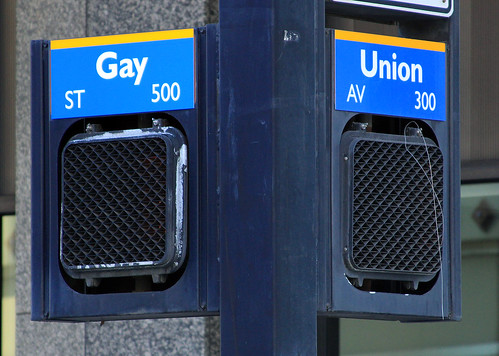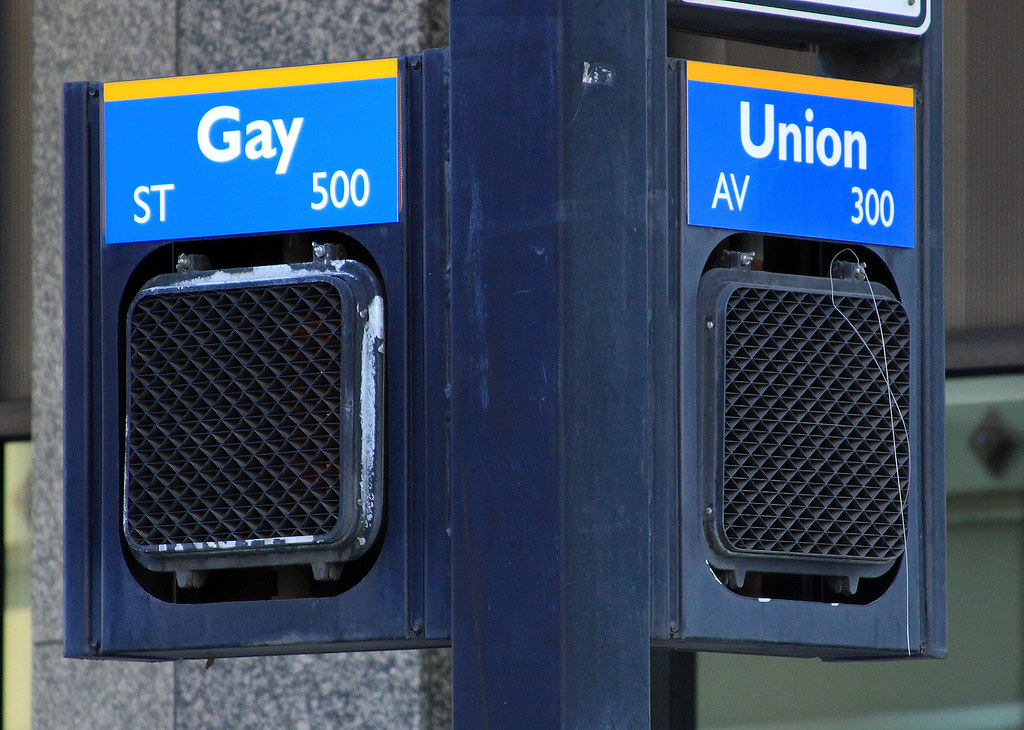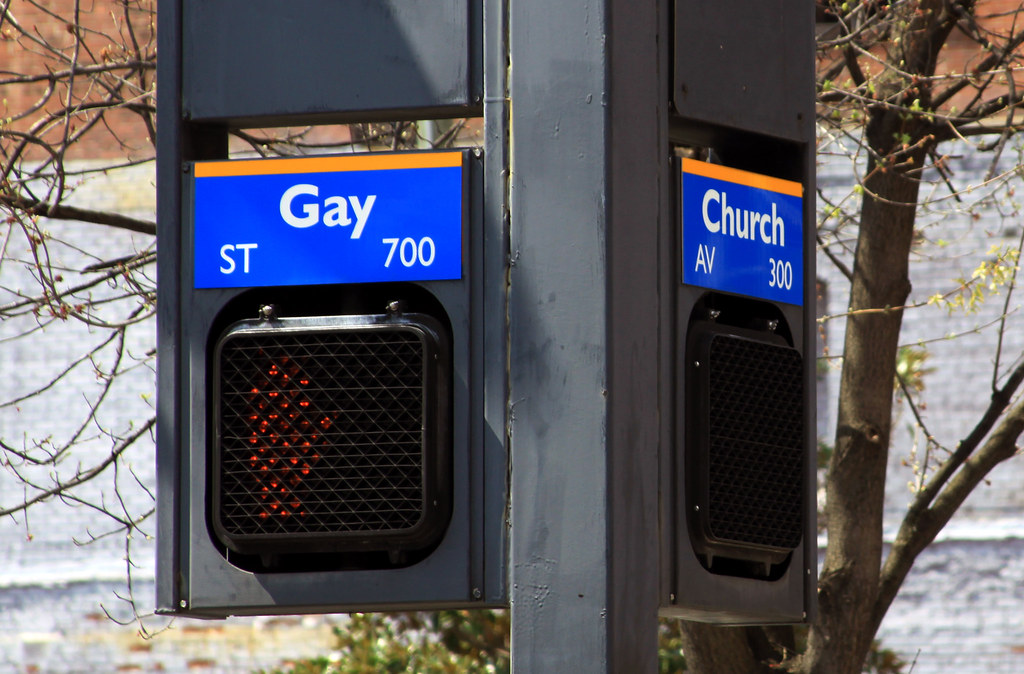I have a confession to make: I find myself perversely fascinated by the whole Park51 debate. I often teach my freshmen about framing narratives in my 101 course, and the story frames surrounding this erstwhile "community center" for reasoned Islamic outreach turned "9/11 victory mosque," and the public flap which erupted with the change of story, is a perfect example of that. It just goes to prove that it's not really events or circumstances that we often react to, but rather how we are told the story. Although
the article at Salon.com doesn't quite put it in those terms, Justin Elliot does a great job of showing the change in public opinion based on how the information was preached. It's interesting how nobody cared about people praying in that building for two years until someone connected it to 9/11 and went on a rant-fest.
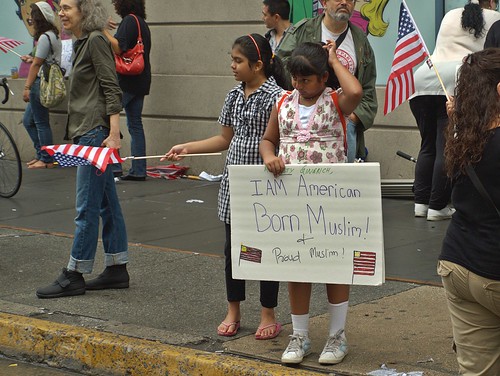
So anyhow, since I was at a protest a couple of weeks ago, I've been looking at the way the protest has progressed on Flickr just to compare notes. In one picture, I saw this picture of a couple of little kids supporting the Park51 center with American flags in hand, and I smiled. Then I saw a picture of a man across the street in a military T-shirt holding a crude drawing of the prophet Muhammad as a pig. It had the word "pedophile" written across the top. Then I really wanted to throw up.
Certainly, the whole Manhattan mosque debate isn't the only reason for my recent political ambivalence, but it sure crystallizes a lot of issues I've had with my moral place in the political universe recently. You see, I have come to realize over the last few weeks that, while I still feel like I still have a lot to offer a conservative political philosophy, I look around at our rapidly-approaching mainstream Tea Party movement and the wackos who cling to its sides like remoras, only to discover that it has absolutely nothing to offer
me. I see hate and intolerance, violation of freedom out of fear, decisions gauged by reflex instead of reason... what the hell just happened? Where's the voice of reason in all this madness? If she's calling out, I can't hear it through all the static I'm getting from the hate-mongers.
Certainly my dis-ease has been brewing for a while, but what has finally pushed me over the edge has been the response to the immigration and Islam debates. There are no ideals backing up these ideas anymore. It's entirely about fear. We're terrified of the threat of the "other" so we try to force them into hiding with a noisy show of force. We make them out as less than human, and this entrenched fear, ironically, scares me. For the sake of my own sanity and the people I am trying to help, I realized that I couldn't stay here any more, and I am now essentially a woman without a country. It's time for me to pack my philosophical bags, move into exile, and pine for the loss of my homeland. I am no longer a conservative; I'm a refugee.
Don't get me wrong: my identity as a "conservative" has always been an uneasy fit. (Heck, I stopped being a "Republican" years ago.) It's not always easy for a rabidly pro-gay justice freak who doesn't support the death penalty and supports affirmative action (though I would prefer that it be governed by socio-economic issues instead of race) to fit in even in the big-tent ideology of the conservative movement. I still like the idea of fiscal responsibility. I still think you can get things done better on the state rather than the federal level. I'm still convinced that a tightly regulated capitalism is the best way to improve the lot of all people in the world (although that stance requires a
lot of explanation, I know.) I see immigration reform as a necessity because it's a huge human rights issue; you can't turn a blind eye to people being shipped about and slaughtered like animals in the desert by coyotes just to make them second-class citizens without legal protections in the US. And I truly feel that the Constitution is our best judge of how to protect the rights of both the greatest and least in our society. We just have to let it do what it does best-- protect freedoms and limit interference of persons and institutions against the inalienable rights of the individual.
But it's that last issue, the Constitution, that's been the last straw for me. I think what finally pushed me over the edge was all this talk about changing the Constitution on the one hand and ignoring what it says on the other. There are mainstream conservatives-- some whom I have respected even when I haven't entirely agreed with them-- who have seriously considered looking into changing citizenship requirements listed in the 14th Amendment to deny citizenship to people born on American soil. And when Americans start protesting the right of other Americans to peacefully practice their faith-- and offering state land to a religious group to make everyone happy-- I really start to fret. On the one hand, that interference in Park51's right to exist under the rule of New York law is a violation of the separation of church and state. On the other hand, so is an elected official offering to give state land to a religious entity to incentivise the move, and both of these should have bothered true conservatives deeply. But they're the ones
promoting it.
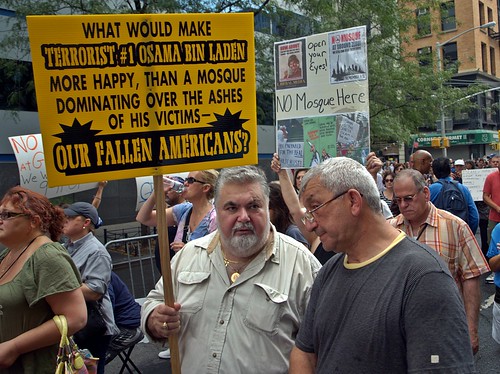
I have yet to hear anyone patrolling the border or arguing against amnesty talk about the plight of those immigrants-- they're a "cancer" or a "drain." Real American citizens are "anchor babies." When asked where she'd like the Cordoba Initiative to move their Islamic center to if she didn't like it at Ground Zero, one woman said "they ought to move it to the Middle East." When asked what injury or injustice building a moderate-leaning mosque would cause two blocks away from the WTC, the only response I've seen from opponents like these guys is that it's "offensive" or that their feelings are hurt. The last time I checked, getting your feelings hurt wasn't a violation of your civil rights. Preventing the free exercise of one's faith, however, in a privately owned building set aside for that purpose
is. Besides-- let's take the whole WTC fiasco out of the equation entirely and look closer to home. If that's the only reason this mosque is an issue, then why are two similar projects in my home state in Appalachia getting this same kind of resistance, with protesters in one nearby town bringing their dogs just to offend the Muslims?
I wish that I could blame this on just a few crazies in the conservative movement, but I can't. Conservative politicians whom I used to respect have weighed in on the mosque conflict, asking for it to be moved; Franklin Graham, whose charities I had previously supported, not only viciously opposes the Park51 mosque but recently called Obama a "Muslim," and he's extremely influential in my circles. That makes him part of a too large minority in the conservative movement who seem to be calling the shots more and more. Add that to the entire state of Arizona, several other states considering similar statutes, and the score of mainline conservative leaders seriously considering changing the 14th Amendment to deny citizenship to native-born people based on the crimes of their parents, and I'm absolutely flummoxed. I feel like I woke up on another planet.
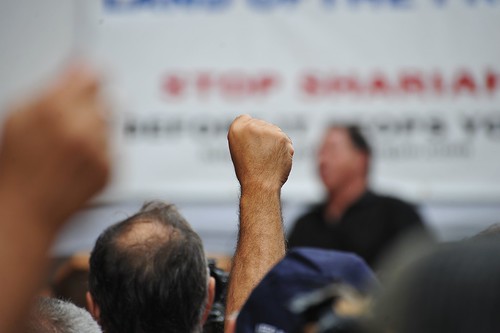
I can no longer consider myself a member of an ideology whose fear has made them do violence to the First Amendment and seriously consider dismantling the Fourteenth. With the exception of Prohibition (which was rightly fixed), basically all of the additions to the Bill of Rights have been to extend freedoms to the people, not to limit them. And the proposed change to citizenship standards, as well as for a proposed Constitutional amendment preventing gay marriage, do the opposite.
I certainly hold no ill feelings towards those who, unlike me, have the fortitude to stay behind and fight this out on the front lines in the conservative movement; rather, I wish them well, for I know that if I were to stay it would wear me down. All I know is that I can find no leadership who represents me, and I don't really know how to stay behind among them without tacitly supporting the same civil cancers I'm fighting against. As such, I feel it's time for me-- at least for a little while-- to leave this homeland behind, not to reject it, but to kneel here at the waters of my American Babylon and lament its descent into madness. Welcome to exile, Jackrabbit.
PHOTO CREDIT:
1) Two young girls protesting on behalf of Park51, from
david_shankbone's Flickr photostream.
2) NYC protesters against the Park51 mosque, from
david_shankbone's Flickr photostream.
3) NYC protesters against the Park51 mosque, from
asterix611's Flickr photostream.
 In case you hadn't heard, the head of the nation's largest "ex-gay" ministry, Exodus International, announced that they would be closing its doors and offered an apology to the LGBT community for the damage they caused. You can watch the video below if you haven't seen it.
In case you hadn't heard, the head of the nation's largest "ex-gay" ministry, Exodus International, announced that they would be closing its doors and offered an apology to the LGBT community for the damage they caused. You can watch the video below if you haven't seen it. 




